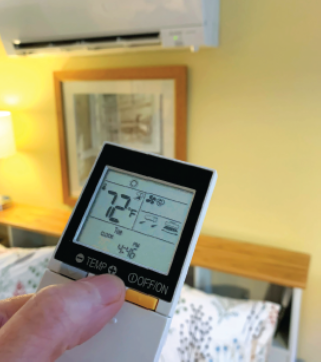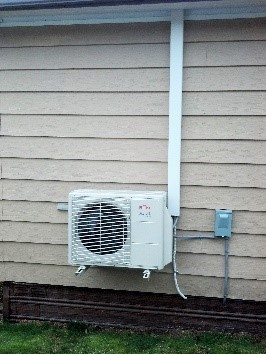 207-885-0771
207-885-0771Set your thermostat for comfort. Set you heat pump’s thermostat to a temperature that makes you feel most comfortable. Because heat pumps are positioned higher, and hence so is the thermostat, this may be higher temp than you are used to.

Minimize changes to the temperature setting. Once get to a temperature that you like, leave it alone. Heat pumps are designed to maintain a steady temperature. This is likely different than what you are used to with a traditional heating system that you turn down at night or when you are at work, then turn up when you are home. Heat pumps actually will use more energy and run less efficiently if you turn them up and down during the course of the day.
Avoid auto mode. Set your heat pump to heat in winter and cool in summer for best temperature control for the season. Auto mode automatically switches between heating and cooling based on the indoor temperature so the system could start generating heat on a cool summer night or cooling on a warm winter day.
Prioritize your heat pump. If you have more than one heating system, maximize your energy savings by prioritizing you heat pump as the primary heating source. Set the thermostat of the other system at least 10 degrees lower than the heat pump temperature setting. More you rely on your heat pump, the more you will save.
Maximize the heating zone of your heat pump. Leave doors open to other rooms to spread heat throughout your house, or close doors to rooms you don’t want heated.
Optimize the air flow direction. Optimize the heating and cooling of your heat pump by controlling where the fan directs air. Directing cool air up (because cold air sinks) and warm air down (because warm air rises) is usually best. See what is best for you. Some models allow you to change the air flow direction with the remote control.
Optimize the fan setting. Start by using “Auto Fan” mode (NOT auto heat/cool mode). If auto fan doesn’t circulate enough air to suit you, then try a fixed speed. For bigger areas, you may need to set your fan to higher setting.
Expect new sounds. Heat pumps are remarkably quiet, nearly silent most of the time. However, you might hear gurgling or clicking noises now and again. These are normal sounds of operation.
Don’t worry about idling. Heat pumps enter idle mode when they reach their target temperature or need to defrost. The indoor fan will continue to run at a very low speed even when the system is not heating or cooling. The system will restart when there is a call for heat or cooling, or when defrosting cycle has completed.
Watch for indicator lights. Consult your user’s manual to determine what the indicator lights mean on your particular unit. Don’t ignore indicator lights as they will impact efficiency and may cause damage to the unit if not attended to.
Clean your dust filters. Heat pumps work best when the dust filter is kept clean. Vacuum or rinse and dry the filter when it becomes dirty or when the filter light comes on. If your model has an allergen cartridge, be sure to wash or replace that according to the manufacturer’s recommendations.

Keep your outdoor unit clean. Make sure you clean off snow and ice, and clear any debris or plant growth on or around your outdoor unit. These may impede airflow and therefore operation.
Have your heat pump serviced every 1-2 years. Be sure to hire a heat pump service professional to clean and inspect your unit. Regular maintenance will ensure top performance, optimal energy efficiency, and longevity of the unit.
This is a great video from Efficiency Maine further explaining care and operation of heat pumps: